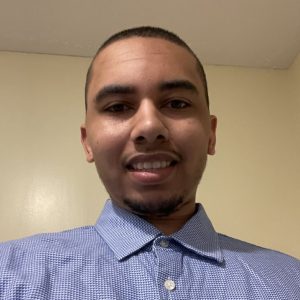
埃梅卡奇玛
Expert in Information Systems and Peer Support Specialist: Emeka Chima
Emeka Chima earned an associate of arts degree from Montgomery College in Germantown, Maryland, in 2020, and in 2022 he received a bachelor’s degree from the University of Maryland Global Campus in the field of Information Systems. At Montgomery College, he was a Dean’s List recipient twice and was inducted into the Phi Theta Kappa Honor Society. He currently works as a peer support specialist for an outpatient mental healthcare clinic for first episode psychosis adolescents and young adults.
Raised by his Nigerian father and his mother from Washington, D.C., Emeka experienced a happy childhood. As the oldest of five, he had the privilege to watch over his younger siblings. In high school, he played soccer and flag football, winning three trophies. His mother is currently a cybersecurity analyst for a Department of Defense contractor. Emeka would also like to work in such a field.
However, about age 15, Emeka began to hear voices. Initially, while in class, the voices would command him to look away in the distance. Gradually, the voices became more powerful, telling him to isolate himself from others, even family members whom he loved.
一天晚上,这些声音命令埃梅卡用刀割伤自己。他变得妄想,认为如果他只是伤害自己,“一切都会好起来的。”他记得当他向空中挥舞刀时惊慌失措和尖叫。回想起来,埃梅卡难以描述自己当时的想法。他觉得自己好像需要逃跑。
Emeka 的阿姨听到他的尖叫声并缓和了局势,让他平静下来,同时说服他放下刀。事后,埃梅卡因“出轨”而感到内疚,并没有意识到自己正在与严重的精神疾病作斗争。
A few weeks later, Emeka had a similar experience, brandishing another knife, but this time he was alone. The voices commanded him to keep the knife with him at all times for self-defense. Although the voices sounded like a family member to Emeka, he realized that his family would never want him to harm himself. In the following days, Emeka confided in his father that he was hearing voices and stated that he might need help.
Soon after, during the night, Emeka began hallucinating again. This time, he heard a crowd of people, unexpected visitors who came without immediate warning and seemed closer in his imagination than reality. As the night went on, Emeka heard a voice consoling him and confirming that everything would be okay, as well as another voice telling him to hurt himself.
第二天早上,当 Emeka 的父亲去卧室看 Emeka 时,他认为 Emeka 可能是癫痫发作了。埃梅卡的祖父多年来一直与躁郁症作斗争,他的父亲怀疑埃梅卡也有精神病。他们一起去了医院。
在医院期间,埃梅卡被诊断出患有偏执型精神分裂症。他还只有15岁。尽管被告知他患有脑部疾病而遭受重创,但埃梅卡了解到他的症状可以用他的诊断来解释,这让他松了一口气。他还发现有治疗方法。在精神病房呆了三个星期后,他病情稳定,出院并重返学校。那时他还是小学生。
The next year was difficult for Emeka. The first medications he tried left his eyes bloodshot, and he felt like he had a hangover though he never drank alcohol or abused drugs. He did not have a regular doctor and often forgot to take his medication. Over the next year, he was hospitalized four times for breakthrough symptoms, but the hospitalizations resulted in little benefit.
During September of Emeka’s senior year of high school, however, he had a new start when he was accepted into a treatment program called EPIC (Early Psychosis Intervention Clinic) through Johns Hopkins Medicine. Through EPIC, Emeka began a trial of clozapine, a medication for treatment-resistant patients. Within a week, Emeka began to see great improvement. He recalls feeling like his recovery on clozapine was a “miracle.”
On clozapine, Emeka finished high school with high honors, winning awards for every class. He did not know exactly what career he wanted to pursue, but he was confident that he would succeed.
After high school, Emeka completed his information systems degree and has recently received honors towards his bachelor’s degree at the University of Maryland Global Campus. He has also been involved with the nonprofit organization, Students with Psychosis since April 2020 and serves as President on its Executive Board.
Emeka says: “When it comes to young people with brain disorders, I would advise not to hesitate to receive help because there is both a physical and emotional need to be surrounded by people who understand. Working through the recovery process can feel overwhelming, but we can develop the resilience to achieve mental wellness.”

